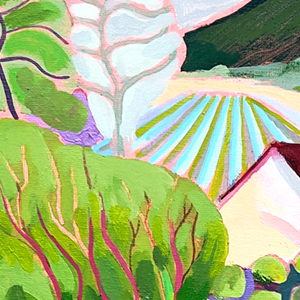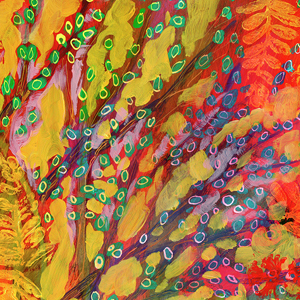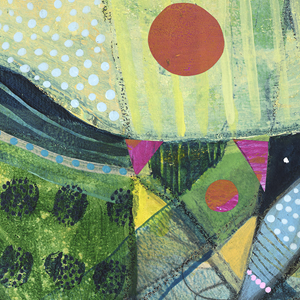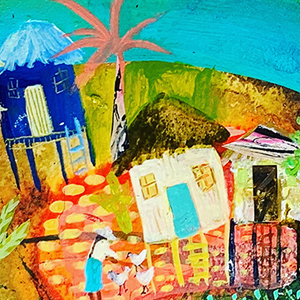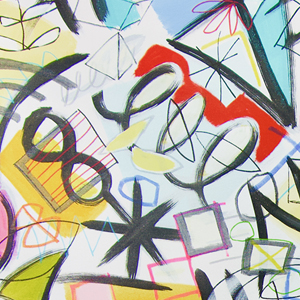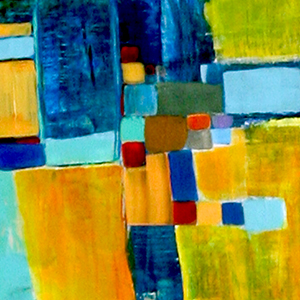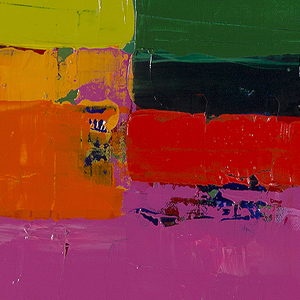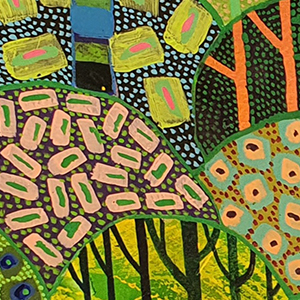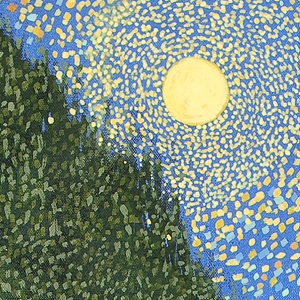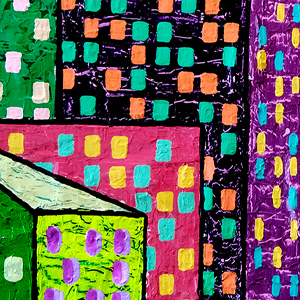
Interlude
Generous Love from the Depths
Fr. Martin Lam Nguyen, CSC
Artwork: “Sunlight” by Jim Aproberts © 2023
Last February, I was in Nha Trang, Vietnam, a quick stop during my two-week travels in the country. Not too far away is Cam Ranh Bay, a strategic naval base during the Vietnam War. The bursting nightlife of the modern Nha Trang is a far cry from its days of war and the aftermath struggle of the state sanctioned economy. My hotel was not too far from the beautiful Catholic stone cathedral built by the French missionaries. I could hear its bell tolls late into the night and early morning. I thought of the late Francis Xavier Nguyen Van Thuan, who was declared Venerable in 2017 by Pope Francis and was Bishop of this diocese from 1967 to 1975. He was an exemplar of generous love in the midst of poverty and suffering.
Bishop Thuan arrived at this cathedral as a young thirty-nine-year-old bishop, full of energy and aspirations, seemingly untouched by his own family’s tragedies. His uncle Ngo Dinh Diem, the first president of South Vietnam, along with two other uncles, were killed in a coup d’état in 1963. The Vietnam War was quickly drawing to its end, with heavy casualties and enormous destruction broadcast daily around the world.
In April 1975, Thuan was made Coadjutor Archbishop of Saigon two weeks before the fall of the city. His appointment was met immediately by the new government’s angry denunciation, and protested by some prominent Catholic priests and lay people. In August 1975, he was arrested and brought back to Nha Trang to begin his life changing journey as a prisoner for the next 13 years.
In March 1976, Bishop Thuan was languishing in a dark cell not too far from a church of his former diocese. There were three layers of walls from his cell to the fresh air outside. Lights were kept on for days, then darkness followed. White fungi grew on his sleeping mat. In thick humidity, he had to lie down on the floor with his nose at the doorframe, gasping for air. In isolation, the bishop’s physical and mental conditions had deteriorated. He could hardly pray. Then one night in great turmoil and confusion, he received a voice telling him: “Why tortured in distress? You still have so much in your heart to give to others. You must love them!”
From that time on, Thuan learned to live in a harsh prison like a free man. The guards at first ignored his greetings and smile. But he kept loving these men from his heart. Eventually, he made friends with them by teaching them languages and Gregorian chants. He cooked for them and told them stories of different cultures where he had visited. They helped him carve a wooden cross and made a necklace out of electric wires which he later wore in his exiled days working in the Vatican. Some officers revealed to him that they were assigned to spy on him. Some even left the Communist party and were baptized. One can only give what one has. How could Thuan give so generously while he himself had no freedom, no rights, no possessions, and no future?
The story of this bishop in prison reminds me of Jesus’ observation of the poor widow giving two small coins at the temple treasury. He told his disciples: “This poor widow put in more than all the other contributors to the treasury. For they have all contributed from their surplus wealth, but she, from her poverty, has contributed all she had, her whole livelihood” (Mark 12:43–44). To be generous is to give from one’s poverty, not from surplus. Writing on poverty, I must acknowledge that though I have experienced some hardships in life, I have quite a lot. Therefore, I am writing from a safe distance, always tempted by the tendency to romanticize.
Jesus chose to be poor. He chose to be human. He did not idealize poverty in itself as a concept; he encountered real people in the full complexity of human life.
The poor would not wish poverty on any other human beings, because poverty can be very painful and humiliating. People in poverty sometimes think only of food because they are too hungry. They can be overwhelmed and consumed by hunger, thirst, pain, fear, or distress. Jesus, and he alone, “sees” poverty as it is, in its gravity and depth, and he transforms the reality in his choice to become human. At the center of this reality is Jesus’ “kenosis,” or self-emptying. Jesus’ kenosis points to a new way of being: a heart that is stripped of security and possessions could nonetheless become boldly and freely open to God and others.
In order to move from being poor to giving all, one must first hear an inner voice of grace. “Hail Mary, full of grace! The Lord is with you!” (Luke 1:28). This greeting from the archangel Gabriel to Mary is a familiar voice of this sort. The soul stands open in the light of grace. In that moment, one is defined not by what one possesses but rather by how one is possessed by God. And Mary said: “My soul proclaims the greatness of the Lord . . . from this day all generations will call me blessed.” In this manner, the poor widow put in “all she had.” And Francis Xavier Nguyen Van Thuan set out to love his guards, one at a time, without exception.
One day a guard asked Bishop Thuan: “When you are released, will you send your people to kill us?” — “No, no, I do not revenge. I really love you. We have been together here for so long; you know I am truthful in telling you that I love you.” — “But why do you love us and forgive us?” — “I must love you, even if you were to kill me. Because if I don’t, I don’t deserve to be called Christian.”
A life of generosity is the opposite of a life of calculation. With calculation, we act out of fear and distrust. More often than not, this life of calculation takes place in surplus rather than need. Possession and security require protection and locks. They spur the need for competition and comparison. Moving from calculation to the beauty of the present moment includes not only attending to the task at hand, the person in front of us, but to our true dependency. After an anointing Mass, a friend of mine told his family and friends of the moment the doctor told him he had late-stage lung cancer. “The sky was falling on me. Time stopped. My mind went blank. I didn’t know what to tell my wife, who was waiting in the car.” But in the moment of his poverty, he was compelled to look for God.
Bishop Thuan discovered he could still love from a dark cell. One dark night, he was handcuffed with a Buddhist former congressman of the South Vietnamese government, along with 1,500 other prisoners, and walked down into the hulk of a coal ship docked in the Saigon River. Noon the next day, the ship took them to Hai Phong, a port city in North Vietnam. They were then led out to another prison camp 30 miles from Ha Noi. For years nobody heard anything about this priest; memorial Masses were offered for him. His generous life was like a grain of wheat in the ground.
We wouldn’t know anything about the generous poor widow in the crowded temple area had Jesus looked at the poor as we often do. Why did he notice her? Did she remind him of Mary, his own widowed mother in Nazareth? We don’t know. Certainly, we should thank Jesus for recognizing this moment of generosity for us. And I am thankful for the opportunity my trip to Vietnam afforded to remind me of Bishop Thuan’s faithful suffering. May we all hear an inner voice of grace, opening the door to a generous, expansive life marked by love.
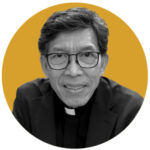 Fr. Martin Lam Nguyen, CSC was born in Vietnam and immigrated to the United States in 1979. He is a priest of the Congregation of Holy Cross. He joined the Department of Art, Art History and Design of the University of Notre Dame in 1995. Fr. Nguyen creates large scale works in drawing and various painting media. His works are site-specific installations, designed to provide a contemplative space for viewers to review the practice of “looking.”
Fr. Martin Lam Nguyen, CSC was born in Vietnam and immigrated to the United States in 1979. He is a priest of the Congregation of Holy Cross. He joined the Department of Art, Art History and Design of the University of Notre Dame in 1995. Fr. Nguyen creates large scale works in drawing and various painting media. His works are site-specific installations, designed to provide a contemplative space for viewers to review the practice of “looking.”
Fall 2024
Part I: Abundant Virtue
Laurie L. Patton
Sarah A. Schnitker
Patricia Snell Herzog
Melissa Fitzpatrick
Dirk Philipsen
Interlude: Generous Eyes, Radical Love
Fr. Martin Lam Nguyen, CSC
Part II: Abundant Vocation
MORE





